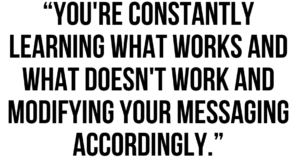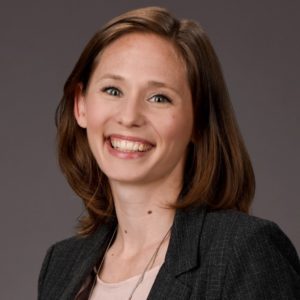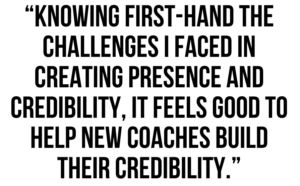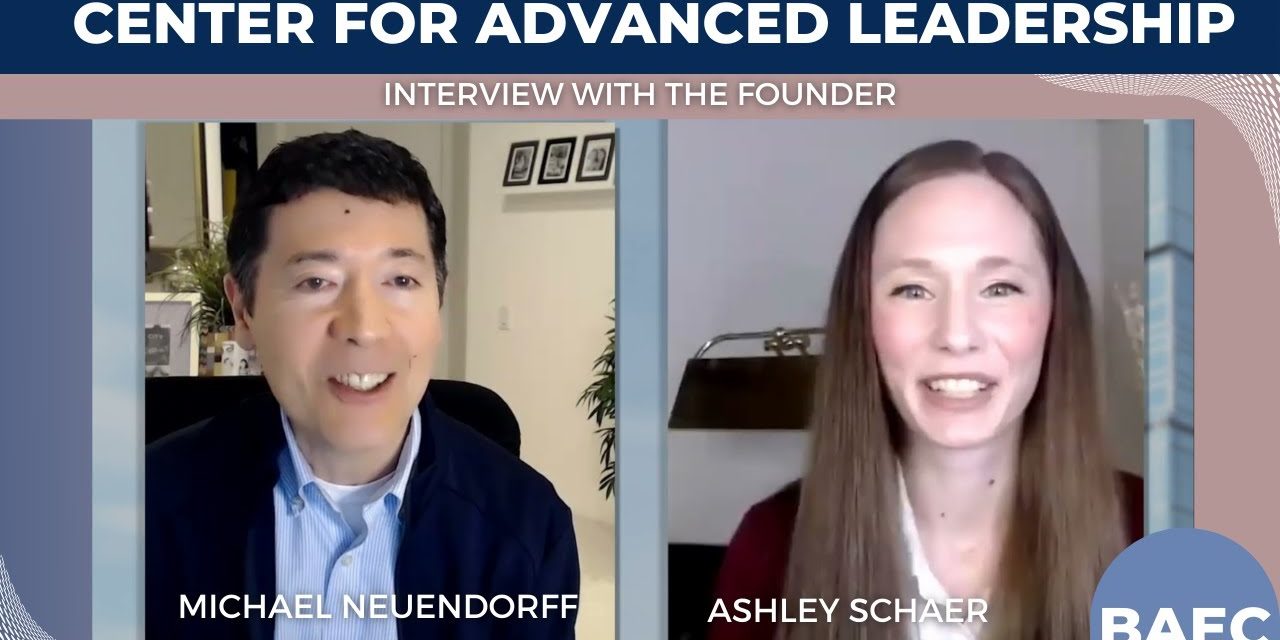Recently, Bay Area Executive Coach’s Michael Neuendorff had the opportunity to talk with Ashley about her blossoming career in leadership coaching and the lessons learned from launching the Center for Advanced Leadership. Here’s their lively discussion.
Michael Neuendorff: I’d like to start by asking you about the organization you started: the Center for Advanced Leadership. Why did you decide to create an organization versus just going solo and establishing a solo coaching practice?
Ashley Schaer: That’s a great question. When you’re starting out as a coach, there’s a lot of contemplation about your brand, your niche, your messaging. And like a lot of new coaches, I struggled in those areas, so I actually reached out to you, Michael. And as always, I found myself getting some helpful ideas from you to move me forward. There was one thing you mentioned at that time that really resonated with me: “if you sell yourself as the brand, no one can perform in your place.” That’s really what sealed my decision to create a business entity rather than just a practice. I didn’t have to sell myself, I had to sell my brand. That’s why the opportunity seemed so attractive to me.
Michael Neuendorff: I look back on that conversation and I see now that you ran with that idea of establishing a center and establishing a brand. But that brand doesn’t revolve entirely around you, which I think is great. What’s your primary role at the center now?
Ashley Schaer: I focus a lot of my time on the business itself, creating the processes and mechanisms that make the product deliverable. I spend the majority of my time in marketing and sales, doing functions like making new connections on LinkedIn, reaching out and scheduling conversations, managing content, and creating tools and resources for members. I also write newsletters, emails, and social media articles. I’m really focusing on managing the operations of the business and allowing the faculty and other coaches to be the stars of the Center for Advanced Leadership.
Michael Neuendorff: What’s been your biggest challenge so far in getting the center off the ground? 
Ashley Schaer: There was the initial challenge of how do we develop the processes and systems to deliver the program. By leveraging my technical background, that aspect was actually the easy part for me. More challenging was figuring out the messaging and trying to get that right. What I eventually realized is you never really do get it right. You’re constantly learning what works and what doesn’t work and modifying your messaging accordingly. I soon got very comfortable with that aspect of the messaging creation challenge. However when August 2020 came around and it was time for me to start reaching out and getting participants, I felt that I was facing another big challenge. I was new in business. I was pitching a program that no one had ever heard of. I had only12 followers on my business page and no testimonials. The first major challenge was trying to build credibility and create messaging that resonated with potential clients and potential participants.
Michael Neuendorff: How did you deal with the challenge of having no credibility? Many coaches start out with fear and uncertainty around whether it’s better to create an organization like you did or simply go solo. They often have a great track record, as you do of having served in a variety of different leadership roles, but calling themselves a “leadership coach” might be new to the people they know. As a new coach they don’t necessarily have credibility in that role. So how did you address that?
Ashley Schaer: At the Center for Advanced Leadership, one of the first things we decided to do was to host a pilot group. We did that not only to make sure participants got value from the program and that the program structure and the pricing model were on point, but also to gain feedback on our program and get real testimonials. This pilot group became a great opportunity for us to build our credentials and create testimonials and marketing material. We completed that pilot group at the end of January 2022 and we went live with our program in February. So that’s how we started to build credibility.
As we were wrapping up the pilot group, I began creating a plan to really beef up our exposure. We were comfortable with the program and how it works and with our messaging too. I started focusing on sales and marketing, social media, digital marketing, and working a ton of personal connections with potential participants using LinkedIn Sales Navigator.
I was trying to take my 100 to 200 contacts a month and grow that to 1500 or more contacts. But that poses its own problem. That kind of volume is a lot of work to manage and I realized that I needed to find a way to do that too.
Michael Neuendorff: When I look back at the roles you held within the City of Portland, none of them had the title “sales person” or “marketing manager.” So how were you able to handle the sales and marketing aspects of running the Center for Advanced Leadership?
Ashley Schaer: As is often the case, the biggest challenge for me was trying to learn something new. I had to redefine what sales and marketing looked like to me and change that visual. And so, instead of thinking of it as a sales funnel or thinking of it as pure sales, I started thinking of sales and marketing more like an ecosystem where you have this flow of resources and information and your audience is digesting those resources and that information. In that situation the sale of your product becomes a byproduct of the ecosystem you created when sharing your resources.
This might sound a little bit corny, but here’s how I visualized it. Suppose I’m bringing water to a dry valley. People need to know that the water is there. I might tell them: “Hey, there’s water now in that dry valley,” and they might be skeptical and say: “Oh yeah, we’ve been down there and it’s still dry.”
So, I would bring them a glass of water and say: “Here, try this. The water’s really there.” And they might say: “Well, that’s great, but the walk is too difficult to go get the water.”
Then I would explain that the walk is actually pretty easy because it’s flat and it’s not very far at all. My job becomes not telling them about the water but addressing their perceived challenges in getting them to the water, if you get what I mean.
Michael Neuendorff: I do, and I think that’s actually a pretty interesting metaphor because some people feel that they’ve been down that road before of people just telling them things they’d like to hear. I think you’re offering “genuine water” in the sense that the programs you’re running through the Center for Advanced Leadership truly will create better and more effective leaders that are poised for greater things in their careers. It’s water they can drink and enjoy and prosper with, right?
 Ashley Schaer: Absolutely. It’s putting out the message that says: “We can quench that thirst, whatever that thirst is.”
Ashley Schaer: Absolutely. It’s putting out the message that says: “We can quench that thirst, whatever that thirst is.”
Michael Neuendorff: That’s wonderful. So, what’s your current vision for the center?
Ashley Schaer: Well, one thing I’m finding satisfying is getting exposure for other coaches. Knowing first-hand the challenges I faced in creating presence and credibility, it feels good to help new coaches build their credibility. I’m looking to do more of that.
I’m currently building out a coaching program that will serve as a launching pad for coaches who are just establishing themselves. Coaches who attend will learn how to build their credentials, get exposure, get their events promoted, and get support in creating and delivering quality presentations.
Also, they’ll have a champion behind them who can help them, support them, and talk things through with them. For the coaches out there that would like champions to promote their work, I’d love to have a conversation with you to see how we can collaborate.
Michael Neuendorff: I’m sure you’ll be getting a lot of responses to that offer Ashley. You’ve featured guest coaches on webinars talking about a variety of topics. What topics have resonated the most with your following?
Ashley Schaer: We think about topics in three different categories: the Inner Focus, the People Focus, and the Business Focus. The Inner Focus is about shaping your own perceptions and beliefs. The People Focus looks at different behavioral types and communication styles. The Business Focus is more about different frameworks and system solutions.
Hands down, the most popular topics are those around the People Focus. People right now are struggling with working with other people, especially after two years of isolation and remote work. They don’t really want help building relationships as leaders. What they’re looking for are solutions to their people problems, managing those difficult personalities that derail projects, or working with difficult bosses and other communication-related topics. Those are the kinds of subjects that have been really popular with our audience.
Michael Neuendorff: How have you balanced providing one-on-one executive coaching versus developing and presenting group programs for leaders?
Ashley Schaer: The group program is really fairly easy to manage because of the consistency. We meet at the same time on the same days every month. That consistency makes it easy for the one-on-one clients. I reserve certain days of the week for one-on-one engagements. When I don’t have clients in those slots, I’m spending that time reaching out and scheduling more conversations. But the real challenge for me isn’t so much the balance between one-on-one coaching versus group coaching, or even the program development itself.
The challenge is really balancing the sales conversations. If I fill up my schedule, then I can’t be flexible when I’m scheduling prospect conversations. I really need to make sure that I’m leaving time every day where I can insert some of those prospect conversations or set up those conversations.
Michael Neuendorff: And I see that you’re offering coaching yourself. How much coaching are you doing versus all those other things you do in your job?
Ashley Schaer: I have a limit of five engagements at a time, and most of my engagements aren’t actually through the Center for Advanced Leadership. I’ve built a community locally, so a lot of my one-on-one clients are local small business owners who are ramping up or trying to grow their organization.
It’s kind of interesting that I have these two things going on, although I wouldn’t necessarily recommend that for everybody. It’s not always easy trying to message those two things while keeping them separate. But at that same time, being an opportunist, it’s challenging for me to choose one over the other. So, I do both and it seems to be functioning well for me
Michael Neuendorff: I can tell you from my experience, Ashley, that it can be very rewarding to work with small businesses. I started my coaching career doing business coaching and working with a lot of small businesses, and I still have some legacy clients to this day.
It remains a very enjoyable and rewarding part of the work that I do because oftentimes small business owners are isolated. They’re challenged and overwhelmed and running a business isn’t necessarily in their skill set. I found working with them to be interesting and rewarding work.
Ashley Schaer: I could say the same thing about our coaching. We didn’t expect ourselves to be salesmen, but here we are being salesmen. Getting support in areas that feel challenging is really beneficial for many small business owners, especially if they’re deeply involved in their community and want to see their community’s economy grow.
Michael Neuendorff: I’ve noticed on your website that you have a selection of executive coaches working alongside you to provide one-on-one coaching services through the center. How did you choose the coaches working with you?
 Ashley Schaer: The first thing I do is I look for coaches who have gone through the Center for Executive Coaching training because then I know what they’ve been trained on. That gives me confidence we’re all on the same page when it comes to the type of content to be delivered. I also look for those who’ve completed their ICF or BCC certifications so they have some coaching credentials behind them already. And then I consider diversity.
Ashley Schaer: The first thing I do is I look for coaches who have gone through the Center for Executive Coaching training because then I know what they’ve been trained on. That gives me confidence we’re all on the same page when it comes to the type of content to be delivered. I also look for those who’ve completed their ICF or BCC certifications so they have some coaching credentials behind them already. And then I consider diversity.
I want a diverse group of coaches from their professional backgrounds to their genders to their ethnicity and cultures. I really feel that diversity is one of those valuable aspects that the Center for Advanced Leadership offers its members. I also sometimes have clients with special needs that I can’t meet, so I look for folks from the CEC who have experience in those areas.
For example, I had one of my clients with an employee who was getting their PMP, and they were looking for a coach who had completed that certification. The CEC has been really beneficial for me in meeting certain client needs that are outside of my areas of expertise.
Michael Neuendorff: I really love your methodology for how you’re choosing coaches and how you’re assembling them and meeting different needs. It’s true that while an experienced, well-trained coach is right for most coachees, we also know that in the real world people look for coaches who might be of a certain gender, have a certain background, have experience in their industry or, as you said, have the PMP certification because they feel more confident going into the process with that coach. I see you’re meeting those client needs, right?
Ashley Schaer: Yes, and another aspect of that would be their coaching style. When you’re introducing two people who don’t know each other, looking at things like pacing is helpful for finding a good coach. You want a coach that can keep up with the fast- paced individual or perhaps a coach who can methodically think through things for somebody who processes information a bit differently.
You’re also trying to identify elements people have in common so that when you do that introduction, they already have a place to start building a relationship.
Michael Neuendorff: I see the importance of that. I have just one last question to ask you. How important do you think it is for leadership development programs to also include one-on-one coaching as a component?
Ashley Schaer: There are a number of reasons why I feel it’s important for one-on-one coaching to be included. Even in group settings we put our “game face” on, and rightfully so. We want to be articulate, we want to be thoughtful, and we want to consider our reputations when we’re in these group settings. And so when you offer that one-on-one coaching time, it’s really an opportunity to let those raw thoughts out without compromising your reputation.
So, we can start to say things that we wouldn’t otherwise normally say and release those raw thoughts, which is really powerful in being able to actually move forward. Another reason is that competition for mic time; we don’t always feel satisfied that we’ve had enough time talking about our problems. Getting that “me time” where we don’t have to compete with others in the group is really refreshing and it allows the participant to move forward much more quickly.
Michael Neuendorff: I think that’s a great answer, actually, in terms of being able to be raw. I’ve delivered some leadership development programs over the years that have not had any one-on-one coaching within them, and I felt that I never got to know each person behind that facade, so to speak. That’s still a real part of who they are, but it isn’t that “raw self” you talked about.
You want to go deeper with them and have true conversations about what their needs are and what their aspirations are, and how the material you’re presenting might help them meet their needs. I just feel group training and one-on-one coaching is a really strong pairing. I love that CAL is doing that.
Ashley Schaer: Absolutely. That combination of peer networking and then going one-on-one is a powerful combination.
Michael Neuendorff. Well, this interview has been really helpful to me in understanding more about the Center for Advanced Leadership, your vision, and the powerhouse behind it, which is you. Thanks for going behind the scenes with me and sharing so much about it.
Ashley Schaer: Oh, absolutely. I appreciate the opportunity and it is always wonderful to connect with you, Michael. So, thank you for that too.
You can view the video version of this interview by clicking here.
Take a look at our other Conversations with Coaches here, and view the full YouTube playlist here.
Here are more coaching interviews by Bay Area Executive Coach:







